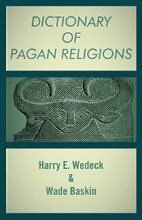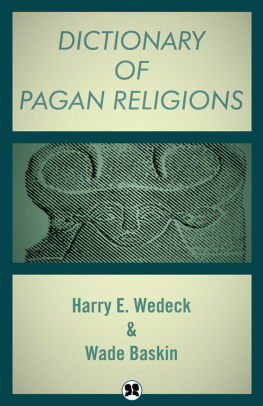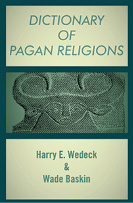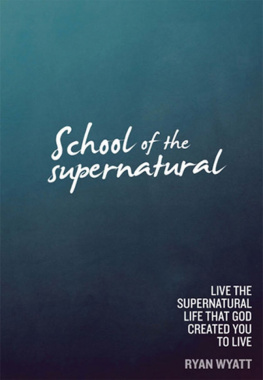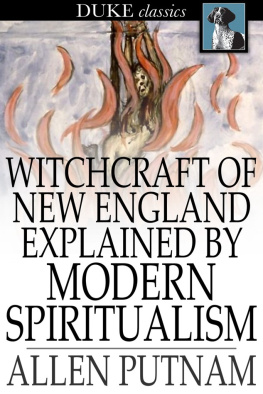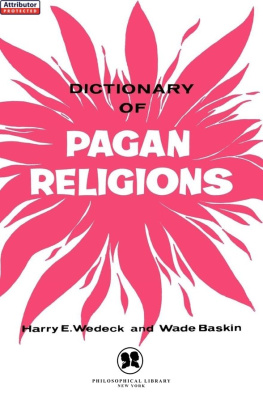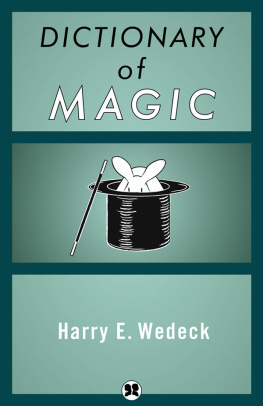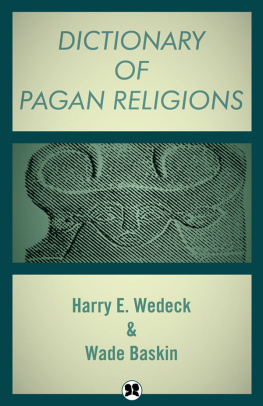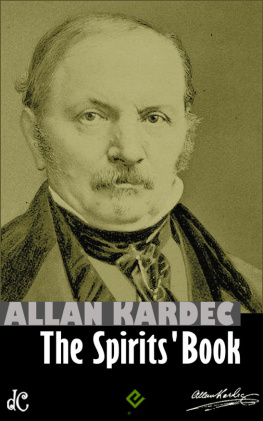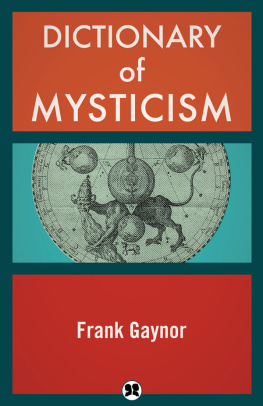Pagebreaks of the print version




Dictionary of Spiritualism
Harry E. Wedeck and Wade Baskin
Introduction
As human beings, we are bounded and constricted by certain acknowledged physical and material circumstances, by corporeal and mental and cosmic limitations that compel us normally to submit perforce to certain ascertainable conditions. We are confined within the periphery of our presumably inherent human characteristics. If by some chance or machination or suddenly discovered faculty we can transcend these rigid natural frontiers, these indurated laws, then we pass into experiences which we say are beyond the natural laws. These experiences cannot conform to human explanations of phenomena as they regularly occur, but pass, or appear to pass, into a zone that knows no such limitations and long accepted barriers. This is the domain of the supernatural. It is the region where what is impossible in human terms becomes possible and actual. It is the realm whose symbol is the paradoxical apothegm: Credo quod impossibile est.
The concept of the Supernatural embraces Heaven and Hell and all that is between. It deals with human beings, with the animate and the inanimate world, with impalpabilities and thoughts. It is easier, in fact, to offer an instance of what might be termed the supernatural than to define it by categorical prescriptions. In its literal sense, in its etymological essence, it denotes that which occurs beyond or above the normal consciousness of humanity. Yet by that very definition it creates a paradox. For one must first of all define what is normal. Normality is that which consistently and repeatedly occurs in the same manner, in a predictable situation, as the rising and the setting of the sun, the force of gravity, the opacity of certain materials. If I can see through a brick wall without interfering with the structure of the wall itself, as in H. G. Wells story, with regard to that visual penetration, I should be actually, abnormally, outside the usual experience of human beings. If I cannot explain this capacity of mine to pierce the opacity of a wall, I am achieving an act that is beyond the natural scheme of things, that is beyond nature, that is, in fact, supernatural.
Or again, as in another of Wells tales, when the severed head of an African native goes rolling along, following an Englishman across country, across the sea, as far as London, that is a phenomenon within the realm of the supernatural.
It is obvious that the term embraces many varieties of phenomena in different situations and in a variety of circumstances. This book surveys, in a strictly academic and objective sense, phenomena, trends, attitudes and views and personalities associated through the sequence of human history with such supernatural facts as are unexplainable in terms of normal human experience. Beginning with antiquity and continuing into the present, the survey ranges over the continents, touching on a multiplicity of ethnic legends, beliefs, and supernatural situations that fall outside the periphery of mans experience.
H. E. W.
A
AANROO In theosophy, this celestial field is surrounded by an iron wall. The dead glean this field and can thus reach the blissful state. Other disembodied spirits proceed to lower zones.
AARON In theosophy he is the Illuminated, the chief of the Hierarchy of the initiated seers.
AARONS ROD A magic wand adorned with an entwined serpent. When it was cast before the Egyptian Pharaoh, it turned into a serpent. Symbolically, the wand now represents the professional magicians skill.
ABARIS In ancient Greek legend, an attendant to Apollo. He was endowed by the god with the power of transvection. In his travels he carried the golden arrow, the gods symbol. He lived without partaking of any food whatever. He helped the Spartans by performing sacrifices that eliminated all plagues thereafter. He was also believed to be the master of the philosopher and mathematician Pythagoras.
ABATUR In mysticism, the Father of the Demiurge of the Universe, the Third Life.
ABBEN-RAGEL An Arabian astrologer, generally known by the Latin name of Alchabitius. His tenth-century treatise on astrology was translated into Latin and printed in 1473, under the title De Judiciis seu fatis stellarum. Many of his predictions were fulfilled.
ABHAMSI In mysticism, a designation of the four orders of beings: gods, demons, pitris, men. Pitris are the ancestors of mankind.
ABIGOR In medieval demonology, the Grand Duke of Hell. He reveals himself as a handsome rider bearing a standard or scepter. He foresees the future, knows the secrets of war, and commands sixty legions.
AB-I-HAYAT In mysticism this term denotes the water of immortality that confers eternal life and eternal youth.
ABIRAM A Biblical character who, with Korach, conspired against Moses. He was swallowed by the earth.
ABODE OF LEARNING Centuries ago this was the headquarters, in Cairo, Egypt, of an Islamic sect. This sect of Shiitesfi was opposed to the concept of Mohammed as a divinely inspired prophet.
ABOMINABLE SNOWMEN Creatures, half-human and half-animal, who are known as Yeti. The Sharpas believe that these creatures dwell in the Himalayas.
ABOU-RYHAN (MOHAMMED-BEN-AHMED) An Arabian astrologer credited with introducing judicial astrology. He is supposed to have possessed to a remarkable degree the power to predict future events.
ABRACADABRA A mystical word which, when written in the form of an inverted triangle and worn on an amulet, is supposed to ward off and cure disease. It is one of the alphabetical and numerical experiments undertaken by Kabbalists.
ABRAHAM, THE JEW A German Jew who was at once an alchemist, magician, and philosopher. He is thought to have been born in Mayence in 1362 and to have received by word of mouth a number of secrets guarded by Abramelin, the Egyptian adept.
ABRAVANEL, JUDAH (c. 14601530) A notable figure in the transition between the Middle Ages and the Renaissance. Jewish physician and scholar. Born in Lisbon, died in Venice. Lived in contact with three cultures: Jewish, Spanish, Italian. He was interested in philosophy, mathematics, astronomy, and lectured at the Universities of Naples and Rome. He was a friend of Pico della Mirandola. His chief work is Dialoghi di Amore. The book was translated into Hebrew, Latin, French, Spanish, English. It was a synthesis of Jewish teachings and Neoplatonic mysticism, and influenced many writers and poets, among them Camoens and Cervantes. He maintained that love was the cosmic principle, inseparable from being. He also maintained that happiness is the union of the human intellect with the Divine intelligence. Although there is an element of pantheism in Abravanel, he stressed his Judaic orthodoxy and tried to reconcile his pantheistic views with the Biblical concept of God.
ABRAXAS In the mysticism of the Gnostic sect, Abraxas was the divine name that was endowed with magic significance.
ABRED In Celtic cosmogony, Abred is the innermost of three concentric circles symbolizing the totality of being. Abred also represents the stage of struggle against Cythrawl, the power of evil.

